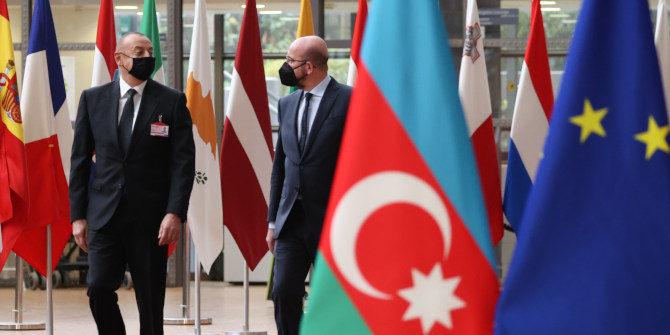The EU’s enlargement process has stalled over the last decade and there appears little prospect of any of the current candidate states securing accession in the near future. Taulant Hasa writes that a failed EU enlargement agenda would have substantial repercussions for the EU’s credibility as a global actor, particularly given other states such as China are now playing an increasingly prominent role in the Western Balkans.
Ahead of the last EU-US summit, Charles Michel, President of the European Council, enthusiastically announced that “America is back”. There were several events that happened during President Biden’s visit to Europe to justify this statement.
First, the NATO summit in Brussels on 14 June eased tensions between some of NATO’s European members and the US, while also targeting the main security challenges emanating from China and Russia. Second, a key source of commercial friction between the US and the EU was resolved with the signing of an agreement on the Boeing and Airbus trade conflict. This has potentially opened the path for further negotiations over an EU-US free trade agreement during the Biden presidency. Third, the US reassured its European partners that it is ready to compromise on climate change.
The US has now reengaged with the EU’s stated priorities of security, trade, and climate change. But one question remains: if America is ‘back’ then when will the EU return to these issues? In all three areas, the EU has been largely stuck in a holding pattern.
None of these pillars stand alone as a single endeavour. The fresh challenges the EU is facing encourage different perspectives and an update to the pragmatism that has characterised EU policymaking since the 2008 financial crisis. The EU’s economic recovery since 2008 has been shallow and a similarly underwhelming recovery has been evident during the pandemic, particularly in southern Europe.
Geopolitically, the Arab Spring and the Ukraine crisis have entrenched the EU’s ‘soft power’ approach. It is arguably a ‘softer’ power now than it was a decade ago. With the new pandemic recovery plan, the EU is giving something back to its member states. But what can it offer for Europe as a whole?
Europe’s stalled enlargement process
A week after Biden’s visit, the Conference on the Future of Europe took centre stage at the European Parliament. Among other conclusions, there was a commitment to open the enlargement process up for countries in the Western Balkans. Yet just a few days later, the European Council decided against taking the next steps toward accession for Albania and North Macedonia.
This time, alongside the pragmatism of Denmark, France, and the Netherlands, it was Bulgaria that sought to attach conditions related to the ethnic foundations and history of North Macedonia as a criterion for the country joining the EU. This is more or less the narrative of the enlargement process over the last decade: institutional commitments to include the Western Balkans in the EU and political disparities between the member states to fix a common agenda for this purpose.
The EU’s enlargement process has targeted the preservation of peace given the involvement of countries in the Western Balkans in the conflicts in the former Yugoslavia. The challenges in the region are substantial in comparison to the previous ‘big bang’ enlargement in 2004, notably in relation to economic transformations and the rule of law. The current trajectory of the integration process is also strikingly different from previous enlargements. This has resulted in additional ‘sticks’ within the proceedings that exist independently from the Copenhagen Criteria and European Commission’s benchmarks.
Rather than focusing on the benefits of this process, the EU approach has tended to lean toward pragmatism. This is despite the fact that integrating Western Balkans states into the EU would potentially reduce the risk of future conflicts and keep other actors at bay who stand to undermine Europe’s stability through their trade and investment activities in the region. Frequent statements since the 2000s have reassured the Western Balkans that they will be future members of the EU, but it is still unclear how this promise will be kept.
Since the end of the Cold War, the international community has added different mechanisms for strengthening global security. Interdependence has been widely developed even among emerging economies, which has triggered global trade flows. In Europe, this principle of fostering interdependence has produced substantial results, not only in terms of economic security, but also at the social level.
In this context, security is widely held to be a fundamental requirement for delivering economic growth and social stability. Both Eurosceptics and Europhiles agree that European integration is not only an economic project, but also a project focused on peace and security. Indeed, the EU’s single market would not be possible without security in Europe.
The EU’s member states must recognise that despite their diverse views on the enlargement process, a failed enlargement agenda would weaken the EU’s capacity to foster peace and prosperity in Europe. It would call into question the EU’s status as a model for the rest of the world, while also undermining its efforts to promote better global governance, the transition to a green economy, human rights, and democracy. EU enlargement has undoubtedly helped strengthen security in Europe and has also clearly benefitted the single market.
Competition from China
The European Parliament has encouraged the other EU institutions, particularly the European Council, to accelerate the enlargement process due to the increasingly prominent role other states are now playing in the Western Balkans.
During the recent G7 and NATO summits, both Italy and Germany expressed scepticism over the threat that China poses for Europe. China is a major market for German exports, and it made headlines by providing early assistance to Italy during the first wave of the Covid-19 pandemic. Italy is also the only western European country that has chosen to participate in China’s ‘belt and road’ initiative.
The Western Balkans represent less than one percent of EU GDP. The impact of the belt and road initiative in the region, which is in dire need of improved infrastructure, could be substantial. China has shown increased willingness to cultivate relationships with emerging economies and the question now for the EU is how it can protect the appeal of its model of governance.
All of this hinges on the enlargement process. The negotiations with their multiple chapters and benchmarks are a mechanism for keeping the membership dream alive for states in the Western Balkans, but it is not clear how resilient these states may become to this strategy.
To deal with this stalled process, the EU must once again put enlargement at the centre of its agenda. The policy undoubtedly remains a useful narrative for tying regional security in the Western Balkans to European security, but the fact remains that there appear few reasons to believe states in the region are likely to join the EU in the near future.
For more information, see the author’s recent LEQS discussion paper
Note: This article gives the views of the author, not the position of EUROPP – European Politics and Policy or the London School of Economics. Featured image credit: European Council





